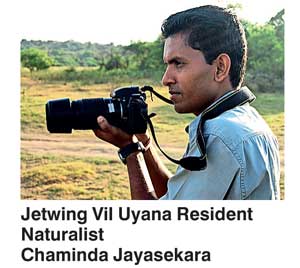Tuesday Feb 24, 2026
Tuesday Feb 24, 2026
Monday, 24 October 2016 00:01 - - {{hitsCtrl.values.hits}}
Jetwing Vil Uyana, Sigiriya, a signature property of the Jetwing family, the resort remains famous for its unique concept and design. Since its inception in 2006, its commitment to sustainability and eco-luxury offerings has been unparalleled and on 28 October, Jetwing Vil Uyana will celebrate its 10th year of excellence.
Leaving aside the exceptional service the hotel offers, there’s much to be spoken about the sustainability practices the property engages in. The layout of the hotel itself embodies the perfect home for flora and fauna, and man to dwell in. The inspiration behind  Jetwing Vil Uyana is the model at the Barnes Wetland, UK – in 2002 a bare land was converted into a man-made wetland enclosure with lakes, reed beds and forest to form a private nature reserve allowing dwellings to be built within a variety of habitats.
Jetwing Vil Uyana is the model at the Barnes Wetland, UK – in 2002 a bare land was converted into a man-made wetland enclosure with lakes, reed beds and forest to form a private nature reserve allowing dwellings to be built within a variety of habitats.
Jetwing Vil Uyana is a record holder of many firsts in the Sri Lankan hospitality industry; from the first man-made wetland to be created, the first Jetwing Youth Development Project (JYDP) implemented and the discovery of the elusive Grey Slender Loris and the establishment of the Loris Conservation Fund, the property is a treasure trove in itself. Jetwing Vil Uyana’s distinctive habitats paved the way for the protection of endangered species, and have even acted as a base for research. This man-made layout has attracted and multiplied a considerable amount of species in comparison to the first faunal diversity assessment conducted prior to the construction of the property. The original assessment revealed 24 species of butterflies, four species of fish, three species of amphibian and reptiles, 29 species of birds and 12 species of mammals. Currently, there are 36 species of butterflies, 120 birds, and 20 species of mammals. In essence, Jetwing Vil Uyana is a haven of wildlife.
Chaminda Jayasekara, Resident Naturalist at Jetwing Vil Uyana has also had the honour of presenting a photographic educational guide on the Dry Zone Slender Loris to His Excellency President Maithripala Sirisena. The guide consists of years of research Chaminda has conducted under the Jetwing Research Initiative on the Loris habitat at the property. The Loris, the smallest recorded primate in Sri Lanka was facing extinction due to threats on its habitat, with Chaminda’s guide acting as a step towards creating awareness on the Loris and the conservation efforts carried out at Jetwing Vil Uyana to protect its habitat.
It is important to note that out of 28 acres of land the property is spread across, 3 1/2 acres of ground alone has been dedicated to the Loris Conservation Site. Before the finding of this rare species by Chaminda in 2010, the said land area was reserved for the installation of additional dwellings for the hotel. Chaminda insisted that the land be preserved as a breeding ground for Loris; this gave birth to the famous ‘Night Walk’, where guests were allowed to witness the elusive species in their natural habitat. In a trail taking guests into a forested area, treading over naturally intertwined branches and bushes the Loris can only be spotted by wearing a red light directed above eye-level.
The animated species with its big round eyes stretching across branches and momentarily posing for the strange inhabitants walking into their home is a pleasure to see. This mysterious creature attracted many a visitors, this way Chaminda was able to initiate the Loris Conservation Fund, which helps in the maintenance of the habitat, conducting educational and awareness programmes, encourage research, and even promote the species as one that needs to be protected.
Among the many faunal varieties that were naturally attracted to the eco-system created at Jetwing Vil Uyana, the Fishing Cat is another animal that was deemed endangered but was spotted within the compound. Interestingly, out of the four types of wildcats that can be found in Sri Lanka (leopard, fishing cat, rusty spotted cat, and jungle cat), all except the leopard can be found freely wandering within the property.
Fishing cats are primarily associated with wetland, and are typically found in swamps and marshy areas. The private nature reserve being Jetwing Vil Uyana is an ideal procreation ground for the species. Since the finding of these rare species, many internationally renowned institutions have approached Jetwing Vil Uyana with the purpose of filming the creature in its natural habitat.
Jetwing Vil Uyana has also been recognised internationally for the wide range of sustainable initiatives it has embarked on. From a HICAP Sustainable Hotel Award, Sri Lanka National Energy Efficiency Award, EU SWITCH Asia Greening Hotels Award in 2012; EU SWITCH Asia Greening Hotels Award and National Green Award in 2013; and PATA Grand Award, WTTC Tourism for Tomorrow Award, National Green Award, THASL Greening Award, Sri Lanka National Energy Efficiency Award in 2014, Jetwing Vil Uyana’s commitment to sustainability has been unmatched.
Jetwing prides itself on being distinct in identity especially through its remarkable dedication to the natural world. As a result, Jetwing believes that tourism cannot exist in isolation and only works well with the understanding of the surroundings. This is heavily practiced at Jetwing Vil Uyana, and had seen through many successes over the 10 years. For that reason, Jetwing celebrates this glorious milestone with the promise of continued bond with sustainability.